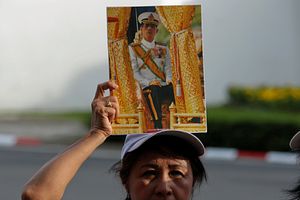Thai Crown Prince Maha Vajiralongkorn was proclaimed king on December 1, becoming King Rama X of the Chakri Dynasty of the Kingdom of Thailand. He will be coronated some time next year, after his father’s remains are cremated. He comes to the throne amid unease rippling the country in the aftermath of the demise of King Bhumibol Adulyadej and in the context of deep sociopolitical divide that has been simmering in Thailand. From an absolute monarchy, Thailand transformed into a constitutional monarchy in 1932 in a coup. Since then, the country has witnessed cyclical alterations between democracy and military authoritarianism.
King Bhumibol ascended to the throne in 1946 when his brother King Ananda Mahidol died (from a gunshot wound received in still-mysterious circumstances). But the new monarch wasn’t officially crowned until four years later and started performing his kingly duties only in 1951 as he was away in Europe for studies. King Bhumibol successfully revived the role and influence of the monarchy in alliance with the military-dominated government. Throughout his reign, Thailand witnessed a number of coups, 20 constitutions, and two popular uprisings, reflecting a high level of political instability.
His active role in Thailand’s turbulent politics made the king the most powerful symbol of national identity and unity, especially after the October 1973 uprising that helped restore and revive the monarchy. The incident also marked the beginning of King Bhumibol‘s direct intervention in Thai politics, which continued up till the start of the 21st century.
For example, King Bhumibol played a significant role in the 1992 domestic political disputes between the junta and thousands of protesters in Bangkok. His popular respect and moral authority helped resolve the political crisis. The king’s intervention in 1992 is widely regarded at home and abroad as the defining proof of his greatness.
King Bhumibol also managed to elevate the nation from a poor agricultural kingdom to a highly advanced digital nation. The widely recognized “sufficiency economy” principle, designed to wean Thailand off reliance on exports, was introduced by King Bhumibol in 1997. Today, Thailand has one of the strongest markets in the region and its $400 billion economy is the second-largest in Southeast Asia.
Even as King Bhumibol’s political interventions won high praises, his critics blamed him for obstructing the development of democratic institutions and for strengthening the military-monarchy-bureaucracy triad at the cost of democracy. He is also criticized for the unfair distribution of economic gains during his reign.
For more than a decade now, Thailand has been crippled by a series of political crises, leaving the country divided and unstable. Most of these upheavals were intended to minimize the influence of former Prime Minister Thaksin Shinawatra in Thai politics. Thaksin, a telephone tycoon turned politician, commands huge support from the rural masses and his political rise had overshadowed the primacy of the monarchy in the country.
In September 2006, the military initiated a bloodless coup against the elected government of Thaksin Shinawatra over alleged corruption, abuse of power, and disrespect for monarchy. Many whispered that the monarchy had given their blessing to the coup. Since 2006, Thailand has experience intermittent political unrest pitting the “yellow shirts” (commonly represented by the elites, the middle class, and the military, forming a loose anti-Thaksin coalition) and the “red shirts” (comprising the rural northern and northeastern Thais who backs Thaksin’s party). Despite living in exile, Thaksin is believed to still play a major role in Thai domestic politics.
With the demise of King Bhumibol, Thailand is now in a state of flux.
Royal succession will be a challenge for Thailand. King Bhumibol designated Crown Prince Maha Vajiralongkorn to be the future King of the Chakra dynasty in 1972. The former crown prince, unlike his father, has been linked to several controversies and, despite Article 112 of the Thai criminal code and the lèse majesté law shielding his royal image, his wayward behavior does not go unnoticed or criticized in this age of digital media.
With the new king proclaimed on December 1, Maha Vajiralongkorn inherits both the royal throne that his father held for 70 years and the world’s largest royal fortune. The uncertainties in an already divided Thailand still loom large even though the wait for royal succession is over. Will the new king ever fully win the confidence and the goodwill of the people of Thailand? Will King Vajiralongkorn serve as a unifying force, as his father did? For Thai citizens there are no easy answers to these questions. How his rule will pan out in the coming days and months will have huge implications on the survival of the institution of the monarchy and on the ever-growing political divide in Thailand.
Arenla is a New Delhi-based scholar with a PhD from Jawaharlal Nehru University. Her research interests are political developments in Southeast Asia and wider region of the Asia-Pacific.

































